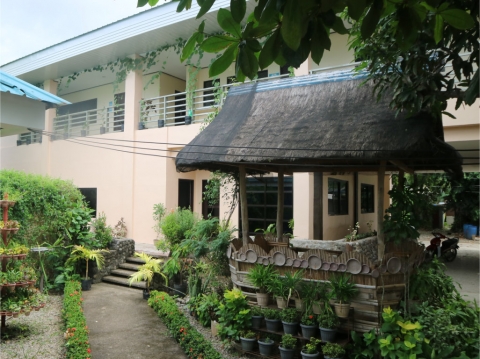On a Monday morning, minutes before eight o’clock, people would rush to the entrance door looking for directions, lining up at the biometrics, or keep last minute errands to prepare for a week-long training. The training management team (TMT) would have arrived at their respective halls at least an hour prior, which was expected of an ATI staff, setting up materials and equipment. Some of the participants would be on their way for billeting, guided by a technical assistant, while others would head on to the breakfast buffet. The start of the week sounds exciting, energizing, and definitely a mix of anxiety for everyone.
At eight o’clock, staff are gathered for Mondays’ prayer, flag ceremony, singing of hymns, and the weekly meeting to set reminders on deliverables.
With center-based trainings, the TMT can do all sort of activities without worrying for IATF safety protocols or the fear of internet disconnection in the middle of an important discussion –only a fear of power shortage or interruption which can easily be resolved with a quick breakout session for bathroom break or even to enjoy the breath of fresh air at the beach.
During their free time, participants would flock at different areas: the hallways, the nipa hut, the entrance couch, the cafeteria, or the beach to catch up and share their field practices with one another. True enough, learning continues even outside the four-walled ATI training halls. The experience was much more than attending these trainings, but the chance to learn from colleagues who work in the same field.
That was how it looked like over a year ago at the Center and at a time where social distancing and face masks weren’t a requirement. Today, Mondays feel no different from any weekday. Only now, Mondays meant meeting everyone back again after a two-day break spent at home.
More than ever, people have a different level of appreciation for those kind of Mondays. For the chances we almost didn’t take and the learning we would have otherwise missed. Since the past year, agencies have opted to conduct activities online, it's not an ideal set-up for farmers and non-tech savvy clients who had to find ways and means to attend these activities - more so in a geographically internet challenged region. While it’s true that if “there’s a will, there’s a way”, the pandemic has crucially molded the patience of our farmers, extension workers, and trainers at once. As it is, extending services to the clients in a formal training already has its challenges. Still, there’s no better way but to adapt to these changes in the hope that one day, sooner, things will get better.
Luckily, for some, blended trainings with online and on-field activities are done. Though it can only be available for certain trainings, the health security of all trainees is on top of other priorities. Hence, postponements are inevitable and prior agreements needed to be revised accordingly. That is just few of the considerations being done with the reported cases in the region going high, or low, in a matter of days.
As such, program plans had to be put on hold at some point during the implementation noting that some extension workers on field have contracted the virus. For others, though, being a close contact meant going on quarantine pending test results. Indeed, people can only do so much and health must not be compromised.
Farmers and extension workers are also frontliners during this pandemic. They go out of their way to, still, keep the farms going and extension service continue to provide assistance for them despite the risk.
Didn’t we all hope this year would be better? The past year gave us a series of lessons to learn and unlearn. Planning, meeting, implementing projects were mostly done online - in front of a camera, mindfully understanding every topic presented to us or vice versa. The changing IATF guidelines from the region, province, to every city or municipality has practically urged us to make things work through various online productivity platforms hoping to limit exposure from the virus. It has, for the more than a year, worked for us. For more than a year, we’ve planned ahead, but have prepared ourselves for redirections. Nope, we can’t talk about failures just yet. If Plan A doesn’t work, there’s 24 more letters in the alphabet you can take.
Mondays today meant a lot of different things. But for sure, the commonality lies on appreciating that it will come. So the next time it does, be present and celebrate the simple joys of the day. Everyone doesn’t live for an eight-to-five job and takes a different coping strategy in this pandemic. Moments come by and go. Take a seat, listen. What are you most thankful for?
For a worker going on an eight-to-five job, Mondays mean the same to me –a start button to keep going, make things work, ‘til Fridays come to a close, weekend takes a peak, and another cycle continues.

